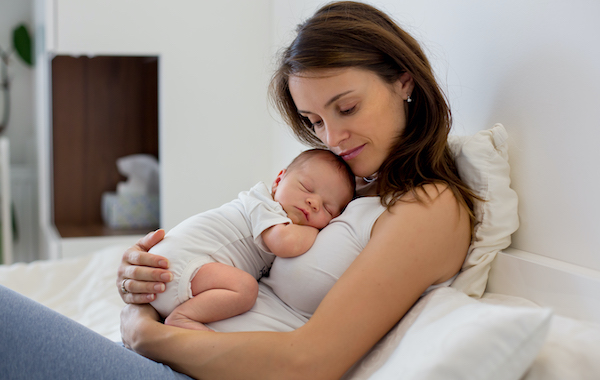Will my period change after pregnancy?
October 12, 2021

Many new moms are surprised by how much they bleed after having a baby. For two to three weeks after a vaginal or cesarean section (C-section) delivery, they experience what looks like a heavy period. This is called lochia, a mix of blood and uterine tissue the body doesn’t need after pregnancy.
Like a period, it typically starts heavy and becomes lighter over time, eventually ending with some spotting. The color will transition from dark red to brownish-pink to off-white. However, you are not ovulating regularly yet – releasing eggs from your ovaries – so lochia isn’t a true menstrual period.
Cramping further blurs the line between lochia and menstrual bleeding. Your uterus expands several times its size to keep up with the growth of your baby; after birth, it shrinks back down. The muscle contractions from this process feel similar to period cramps.
Caring for a newborn will consume most of your attention, but be sure to monitor the amount of blood you’re losing during the first few weeks after delivery. Up to 5% of patients experience uncontrolled bleeding, or postpartum hemorrhage, a condition accompanied by symptoms such as low blood pressure, pale skin, and nausea.
If your blood loss seems excessive, see your provider right away. After lochia ends, the timing, flow, and duration of every woman’s period varies, but enough similarities exist to answer common questions about postpartum menstruation.
When should I expect my first period after pregnancy?
Your first period can come anytime between two and 12 weeks after delivery. For most women, it happens between six and 12 weeks.
If you exclusively breastfeed, your period will likely be delayed until you give your baby solid food and other forms of milk. As your levels of prolactin – the hormone that helps your body produce milk – increase, your levels of estrogen and progesterone decrease. These hormones help regulate your period; lower levels reduce the likelihood of ovulation and menstruation.
While you are experiencing lochia, your flow will act like a typical period: starting heavier, then gradually getting lighter. However, if the amount of blood increases after a few lighter days, consider slowing down your activity level for a few days so your body can rest and heal from childbirth.
Related reading: The ‘fourth trimester’: Why women need health care after delivery
Will my period look or feel different?
Most women can expect their first couple of periods after giving birth to be heavier than those they experienced before pregnancy. Menstrual blood should look like you expect: a bright red that fades into a darker, brownish red. You may see small clots the first time but should not see large clots (the size of a plum or golf ball). If you do, alert your provider.
Some research has shown that C-section scarring can increase period pain as well as flow. In general, postpartum period symptoms will be similar to pre-pregnancy symptoms, so if you used to have cramps, they likely will resume. However, some patients say their period pain improves after pregnancy.
Related reading: What’s going on with my uterus? 3 conditions related to pelvic pain and bleeding
How regular will my menstrual cycle be?
Your period can take up to a year to become regular, no matter how consistent it was before pregnancy. To develop, grow, and deliver a baby, your body experiences several hormonal changes, and it needs time to return to normal.
Breastfeeding moms are even more likely to have an irregular menstrual cycle. When you breastfeed, you have lower levels of estrogen in your body – a hormone that fluctuates with your period. Without normal estrogen fluctuation, you won’t have normal periods.
Whether or not you breastfeed, don’t be alarmed if your second period is late – unless you’ve recently had unprotected sex.
PTSD after pregnancy
You may associate post-traumatic stress disorder with survivors of assault, war, or natural disasters. But as maternal-fetal specialist Dr. Shivani Patel will tell you, symptoms of PTSD can weigh heavy on moms who had complex pregnancies. She knows from personal experience.
Preventing postpartum pregnancy
If you have sex without a reliable form of birth control, you can get pregnant – even in the first few weeks after giving birth. The majority of pregnancies that occur less than a year after a previous birth are unplanned.
You will start ovulating between delivery and your first period – up to six weeks after birth, which is typically the same amount of time we recommend you wait to have sex.
Related reading: Birth control after childbirth: Long-term options for new moms
Research-based recommendations suggest spacing pregnancies by at least 12 to 18 months. Postpartum pregnancy can prevent your body from fully healing from childbirth and put your baby at risk of premature birth and infant mortality. A CDC study also found that a shorter time period between births is linked to autism spectrum disorder.
Risks vary based on your age. So, if you want to get pregnant again soon after giving birth, work with your doctor to develop a safe plan that is specific to your situation.
Postpartum bleeding can be confusing. We’re here to provide clarity. To visit with an Ob/Gyn, call 214-645-8300 or request an appointment online.












